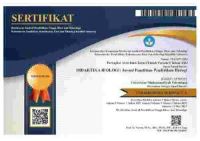KELAYAKAN WEB PEMBELAJARAN BIOLOGI BERBASIS SOCIO-SCIENTIFIC ISSUES TOPIK SISTEM PERNAPASAN UNTUK PENGEMBANGAN LITERASI KESEHATAN SISWA
Abstract
Penulusuran literatur atau penelitian perihal praktik pembelajaran yang berorientasi pada literasi kesehatan khususnya melalui mata pelajaran sains-biologi di Indonesia menunjukkan bahwa pengembangan dan aplikasi desain instruksional belum banyak dihasilkan. Penelitian ini bertujuan untuk mengetahui kelayakan web pembelajaran biologi berbasis Socio-scientific issues (SSI) untuk diimplementasikan dalam pembelajaran biologi di SMA. Metode yang digunakan adalah research & development. Subjek penelitian terdiri dari 2 ahli materi, 2 ahli media, 2 guru biologi, dan 20 siswa SMA. Pengumpulan data dilakukan dengan menggunakan instrumen penilaian dan angket. Data kualitatif dianalisis secara deskriptif kualitatif sebagai bahan revisi media dan data kuatitatif menggunakan persentase untuk penilaian kelayakan. Hasil dari penelitian pengembangan ini adalah web pembelajaran biologi berbasis SSI topik sistem pernapasan untuk mengembangkan literasi kesehatan siswa SMA kelas XI. Web pembelajaran yang dikembangkan telah memenuhi kriteria kelayakan berdasarkan aspek konsep esensial materi biologi, informasi kajian biologi, bahasa kajian biologi, organisasi pembelajaran, dan operasional sajian web berdasarkan hasil penilaian dari ahli materi, ahli media, dan guru biologi. Berdasarkan hasil penilaian tersebut dapat disimpulkan web pembelajaran yang dkembangkan layak digunakan dalam pembelajaran biologi.
Searching the literature or research on learning practices oriented towards health literacy, especially through science-biology subjects in Indonesia, showed that the development and application of instructional design has not been widely produced. This study aimed to determine the feasibility of a biology learning web based on Socio-scientific issues (SSI) to be implemented in biology learning in high school.The method used was research & development. The study subjects consisted of 2 material experts, 2 media experts, 2 biology teachers, and 20 high school students. Data collection was carried out using assessment instruments and questionnaires. Qualitative data were analyzed descriptively qualitatively as media revision material and quantitative data using percentages for feasibility assessment.The result of this development research is a biology learning web based on SSI on the topic of the respiratory system to develop health literacy for high school students. The developed learning web has the feasibility criteria based on aspects of the essential concepts of biological material, information and language of biological studies, learning organization, and web presentation operation. It was Based on the results of assessments from material experts, media experts, biology teachers and limited trial test. Based on the results of the assessment, it can be concluded that the learning web developed is suitable for use in biology learning.
Keywords
Full Text:
PDFReferences
Arikunto, S., (2009). Prosedur Penelitian Suatu Pendekatan Praktik. Edisi Revisi 6. Jakarta: Rineka Cipta.
Brown, J., West, R., Beard, E., Michie, S., Shahab, L., & McNeill, A. (2014). Prevalence and Characteristics of e-Cigarette Users In Great Britain: Findings From A General Population Survey of Smokers. Addictive Behaviors, 39(6), 1120-1125. https://doi.org/10.1016/j.addbeh.2014.03.009
Bruselius-Jensen, M., Bonde, A. H., & Christensen, J. H. (2017). Promoting Health Literacy In the Classroom. Health Education Journal, 76(2), 156–168. https://doi.org/10.1177/0017896916653429
Grace, M., & Bay, J. L. (2011). Developing a Pedagogy to Support Science for Health Literacy, Asia-Pacific Forum on Science Learning and Teaching, 10(1), 1- 13. Retrieved from https://www.eduhk.hk/apfslt/download/v12_issue2_files/foreword.pdf
Lamanauskas, V., & Augiene, D. (2019). Identifying Primary School Teachers’ Health Literacy. Journal of Turkish Science Education, 16(4), 451- 466. https://doi.org/10.36681/tused.2020.0
Nutbeam, D. (2000). Health Literacy as a Public Health Goal: A Challenge for Contemporary Health Education and Communication Strategies into the 21st Century. Health Promotion International, 15(3), 259–267. https://doi.org/10.1093/heapro/15.3.259
OECD (Organization for Economic Cooperation and Development). (2014). OECD Health Statistics 2014: How Does Indonesia Compare? Retrieved from https://www.oecd.org/els/health-systems/Briefing-Note-INDONESIA-2014.pdf
Pearson, J. L., Richardson, A., Niaura, R. S., Vallone, D. M., & Abrams, D. B. (2012). e-Cigarette Awareness, Use, and Harm Perceptions in US Adults. American Journal of Public Health, 102( 9), 1758–1766. https://doi.org/10.2105/AJPH.2011.300526
Permana, T. I., Suwono, H., & Listyorini, D. (2016). Analisis Awal Literasi Kesehatan Siswa SMA Kelas XI MIA di Kabupaten Malang. Prosiding Seminar Nasional II, 430-434. Malang: Kerjasama Prodi Pendidikan Biologi FKIP dengan Pusat Studi Lingkungan dan Kependudukan (PSLK) Universitas Muhammadiyah Malang.
Sadler, T. D. (2004). Informal Reasoning Regarding Socioscientific Issues: A Critical Review of Research. Journal of Research in Science Teaching, 41(5), 513-536. https://doi.org/10.1002/tea.20009
Sinha, D. N., Palipudi, K. M., Rolle, I., Asma, S., & Rinchen, S. (2011). Tobacco Use Among Youth and Adults in Member Countries of South-East Asia Region: Review of Findings from Surveys under the Global Tobacco Surveillance System. Indian Journal of Public Health, 55(3), 169-176. Retrieved from https://www.ijph.in/text.asp?2011/55/3/169/89946
Subiantoro, A. W., Ariyanti, N. A., & Sulistyo. (2013). Pembelajaran Materi Ekosistem dengan Socio-Scientific Issues dan Pengaruhnya Terhadap Reflective Judgment Siswa. Jurnal Pendidikan IPA Indonesia, 2(1), 41-47. https://doi.org/10.15294/jpii.v2i1.2508
Subiantoro, A. W., Handziko, R. C., & Wibowo, Y. (2021). A Narrative Inquiry of Socio-Scientific Issues-Based e-Learning Development in Biology to Promote Student Health Literacy. Biosfer: Jurnal Pendidikan Biologi, 14(1), 132-143. https://doi.org/10.21009/biosferjpb.20373
Sugiyono. (2015). Metode Penelitian & Pengembangan (Research and Development). Bandung: Alfabeta.
Tanuwihardja, R. K., & Susanto, A. D. (2012). Rokok Elektronik (Electronic Cigarette). Jurnal Respirasi Indonesia, 32(1), 53-61. Diakses dari http://arsip.jurnalrespirologi.org/electronic-cigarette/
Vamos, S., Okan, O., Sentell, T., & Rootman, I. (2020). Making a Case for “Education for Health Literacy”: An International Perspective. International Journal of Environmental Research and Public Health, 17(4), 1436. https://doi.org/10.3390/ijerph17041436
WHO (World Health Organization). (?2009)?. Action Plan for the Global Strategy for the Prevention and Control of Noncommunicable Diseases: Prevent and Control Cardiovascular Diseases, Cancers, Chronic Respiratory Diseases and Diabetes. World Health Organization. Retrieved from https://apps.who.int/iris/handle/10665/44009
WHO (World Health Organization). (2013). Health Literacy: The Solid Facts. WHO Regional Office for Europe. Retrieved from https://apps.who.int/iris/handle/10665/326432
WHO (World Health Organization). (2015). Health Literacy Toolkit for Low- and Middle-Income Countries: A Series of Information Sheets To Empower Communities and Strengthen Health Systems. WHO Regional Office for South-East Asia. Retrieved from https://apps.who.int/iris/handle/10665/205244
DOI: https://doi.org/10.32502/dikbio.v6i1.3690
Copyright (c) 2022 Didaktika Biologi: Jurnal Penelitian Pendidikan Biologi
Didaktika Biologi: Jurnal Penelitian Pendidikan Biologi is indexed by:

Didaktika Biologi: Jurnal Penelitian Pendidikan Biologi is licensed under a Creative Commons Attribution-ShareAlike 4.0 International License.







